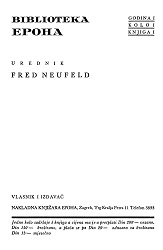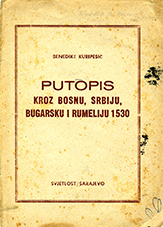

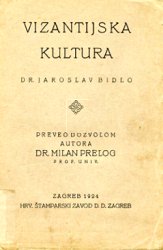
Published in 1924 by HRV. ŠTAMPARSKI ZAVOD D.D., ZAGREB. Translated from Czech to Croatian with permission of the author by Dr. Milan Prelog
More...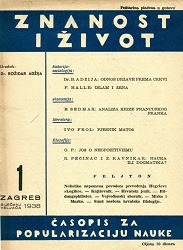
Extract from the issue 1/1938 of the journal Znanost i život
More...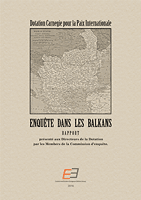
Keywords: Balkan-Wars; Nicolas Murray Butler;Baron d'Estournelles de Constant;Carnegie Foundation;
This 2008 Edition os CEEOL is a Digsimile Edition of the 1914 Report of the Carnegie Foundation. The circumstances which attended the Balkan wars of 1912 and 1913 were of such character as to fix upon them the attention of the civilized world. The conflicting reports as to what actually occurred before and during these wars, together with the persistent rumors often supported by specific and detailed statements as to violations of the laws of war by the several combatants, made it important that an impartial and exhaustive examination should be made of this entire episode in contemporary history. The purpose of such an impartial examination by an independent authority was to inform public opinion and to make plain just what is or may be involved in an international war carried on under modern conditions. If the minds of men can be turned even for a short time away from passion, from race antagonism and from national aggrandizement to a contemplation of the individual and national losses due to war and to the shocking horrors which modern warfare entails, a step and by no means a short one, will have been taken toward the substitution of justice for force in the settlement of international differences. It was with this motive and for this purpose that the Division of Intercourse and Education of the Carnegie Endowment for International Peace constituted in July, 1913, an International Commission of Inquiry to study the recent Balkan wars and to visit the actual scenes where fighting had taken place and the territory which had been devastated. The presidency of this International Commission of Inquiry was entrusted to Baron d'Estournelles de Constant, Senator of France, who had represented his country at the First and Second Hague Conferences of 1899 and of 1907, and who as President Fondateur of the Conciliation Internationale, has labored so long and so effectively to bring the various nations of the world into closer and more sympathetic relations. With Baron d'Estournelles de Constant there were associated men of the highest standing, representing different nationalities, who were able to bring to this important task large experience and broad sympathy. The result of the work of the International Commission of Inquiry is contained in their report. This report, which has been written without prejudice and without partisanship, is respectfully commended to the attention of the governments, the people and the press of the civilized world. To those who so generously participated in its preparation as members of the International Commission of Inquiry, the Trustees of the Carnegie Endowment for International Peace offer an expression of grateful thanks. Nicholas Murray Butler, Acting Director. (February 22, 1914)
More...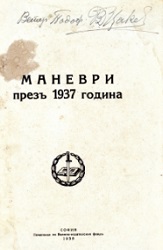
Keywords: European Armies 1937;
The year 1937 saw numerous military maneuvers of the armies all over Europe. The booklet lists the various states and the maneuver-activities of their armies and tries to develop an interpretation of the respective political backgrounds and contexts, together with some conclusions for the near future. Published in 1938 by the Bulgarian Military Printing
More...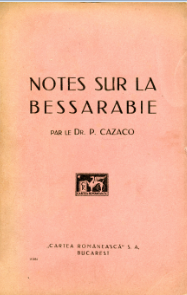
Inspired by passions and diverse interests, these studies on Bessarabia are often far from edifying public opinion. We will therefore endeavor to shed light on this issue, by supporting the following pages with authentic dates and documents, excluding any prevention and any special interest. Published by Cartea Romaneasca, Iaşi, 1926
More...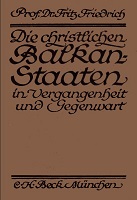
Keywords: Balkan; Balkan-History; Ottoman Empire; Serbian state-building; Romanian state-building; Bulgarian state-building;
Published in 1916 by C. H. Beck (Munich)The small book offers the text of three lectures the author gave in Leipzig in November and December 1915. In the introduction, the author is noticing, that "among all the current war literature nowhere the topic of his book is really touched while, anyhow, whatever provides information is spread in numerous different works and articles." THE ORIGINAL BOOK IS PRINTED IN GERMAN FRAKTURA LETTERS. PLEASE HAVE A LOOK ON THE TABLE OF CONTENT TO MAKE SURE YOU'LL BE ABLE TO READ. The original has been published 2016 in Leipzig by C. H. Beck Publishing House.
More...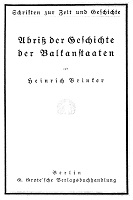
The PDF-document is a copy of the 1916 print in German FRAKTURA - useful for readers only who are able to read this FRAKTURA font. Published in 1916 by G. Grote'sche Verlagsbuchhandlung (Berlin
More...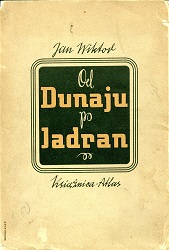
Keywords: Poland and the Balkans; Poland in 1930s; Balkans in 1930s;
Jan Wiktor's new book is one of the most up-to-date publications of the present day. Romanists and Slavicists at Polish universities more fully and deeply embrace the whole spiritual life of our friends from the South and this book fulfills an important task of informing the public about the political, social and cultural development of Romania, Bulgaria and Yugoslavia. // The author intersperses his engaging sketches, cast against the background of the colorful Balkan landscape, with a series of interviews conducted with statesmen and representatives of the literary and artistic world in the countries concerned. Bucharest - the Paris of the East, sun-scorched Dobrudja, Sofia and Varna, dear to the Polish heart, Belgorod and Oplenac with its royal mausoleum - these are some of the stages of a journey full of unforgettable impressions and deep reflections. // The whole story is dominated by the poet's ardent affection and his vivid sentiment for the countryside and the people. In consequence, Jan Wiktor's book is like a golden bridge between the heart of Poland and the hearts of nations so close to us. (Textof the original blurb)
More...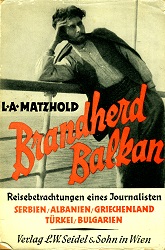
In clear, concise language, Matzhold outlines the situation and the way of life in the Balkan countries, always drawing from his own experience. Pressed and influenced by a dozen different ideologies and religions, they represent a source of fire that begins to flicker incessantly in the most diverse places. The great contrasts are described which exist economically, politically and socially in the heart of the Balkan man, in his family, in the states and finally in the whole region and are in conflict with each other. Here the bandages are mercilessly torn from a wound that keeps Europe feverish and threatens the Balkans themselves, indeed the whole world, with a new war. In the author's view, the fate of the West, of contemporary European civilization, will be decided in the Balkans. (blurb of the original edition) PUBLISHED IN 1936 BY L. W. SEIDEL VERLAG, VIENNA - written by the head correspondent of Associated Press to the Balkans
More...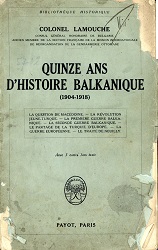
Keywords: Balkan History; Macedonian question; Balkan Wars; Late Ottoman Empire;
The fundamental part of this study consists of the account of my stay in Turkey, from April 1904 to December 1913, but before undertaking it, I believe it essential to expose, with some details, the question of Macedonia which is, in a way, the central point at the same time as the origin, of the events that I will have to relate, to show the development of this question in the XIXth century as well as the situation of the Macedonian region when the Powers, on the initiative of Russia and Austria, decided to send their representatives there. (The author has been Honorary Consul General of Bulgaria, former member of the French section of the International Mission for the Reorganization of the Ottoman Gendarmerie). ORIGINALLY PUBLISHED IN 1928 BY PAYOT, PARIS
More...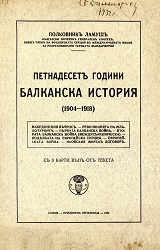
Keywords: Balkan History,; Macedonian Question; Late Ottoman Empire;
essential to expose, with some details, the question of Macedonia which is, in a way, the central point at the same time as the origin, of the events that I will have to relate, to show the development of this question in the XIXth century as well as the situation of the Macedonian region when the Powers, on the initiative of Russia and Austria, decided to send their representatives there. (The author has been Honorary Consul General of Bulgaria, former member of the French section of the International Mission for the Reorganization of the Ottoman Gendarmerie). BULGARIAN EDITION ORIGINALLY PUBLISHED IN 1930 by the NATIONAL MACEDONIAN COMMITTEE, SOFIA
More...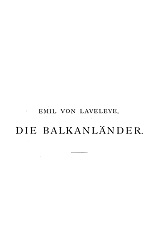
Since the publication of the first volume of my book on the Balkans, everyone has been looking at them with growing fear. It is feared that a clash is taking place there between the Russians and Austrians, affecting all the peoples of Europe and North Asia, from Mount Etna to the North Cape and from the Atlantic Ocean to the distant shores of the Pacific and the mouths of the Amur. But how can the events in Bulgaria, which is so far away, threaten the peace that all peoples and, it seems, all princes want to keep? Well, we are standing at a turning point in history, where the die is to be cast that will decide the fortunes of the East and consequently also of the West. (From the author's introduction)
More...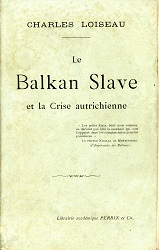
Keywords: Late Habsburg Empire;
This book was begun when public attention, held for more than a year by the affairs of Armenia, Crete and the Greco-Turkish conflict, was suddenly brought back to the Austrian crisis. Its object being to present, not only the Serbs, the Montenegrins and the Bulgarians, but all the South Slavic race, spread from the Black Sea to Trieste, to the state of entity, of ethnic individuality, if the we can say, finally, one by origin, tendencies, interests and international function, - we can well admit that because of certain folds of the Western spirit it seemed to us several times of a difficult realization. On the one hand, it was necessary to insist on the ethnographic data and to put forward one of those theories of “nationalities” which fascinated the generation of 1848, even that of 1860, but are now considered outdated. On the other hand, it was necessary to break with certain usual classifications, which are above all inspired by the outline of the political border: we are used to considering that the "Balkan" begins at the precise point where the Empire ends. of the Habsburgs, and no more solidarity is admitted between these two worlds than between the so-called "Austrian" questions and the Eastern question. (From the author’s introduction) ORIGINALLY PUBLISHED IN1898 BY PERRIN ET CIE, LIBRAIRES-ÉDITEURS, PARIS
More...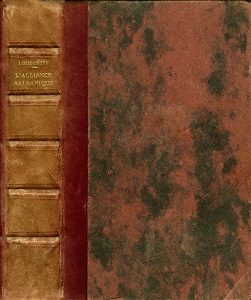
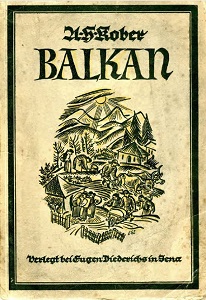
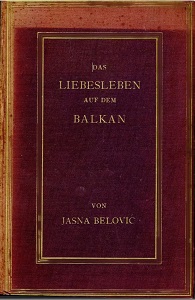
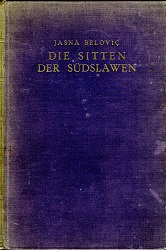
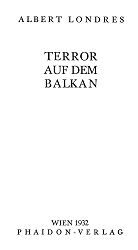
Wien 1932, Phaidon Verlag //Translated from French and with an afterword by Alexander Benzion
More...